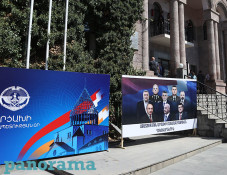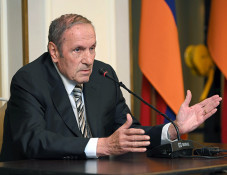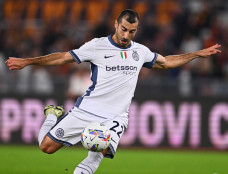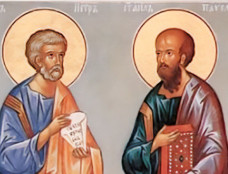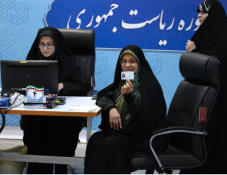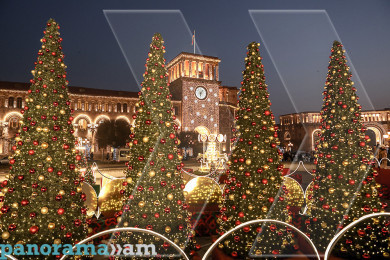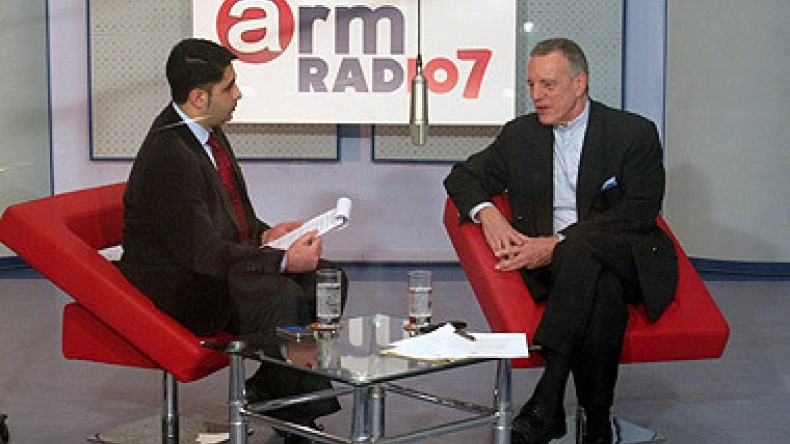
German Ambassador: Juvenilization of party-structures is needed
“Armradio FM 107” hosted Ambassador Extraordinary and Plenipotentiary of Germany to Armenia Hans-Jochen Schmidt. German Ambassador answered to radio commentator Gevorg Melikyan’s questions. Find the interview below:
-Mr. Ambassador, first of all thank you for accepting this invitation and for being with us on the premises of ArmRadio and in the framework of my analytical radio-show. Germany has always been an important country for Armenia and Armenia maintains good relations with this country, but why Germany is interested in Armenia?
A: - Immediately, when the Soviet Union fell apart, our Foreign Minister took the decision to build up relations with each of the Republics of the former Soviet Union. Armenia, I think, represented a certain interest already before the Soviet Union fell apart because of its culture, because of the fact that there were some Armenians in Germany attracting attention to your country, to its values, to Christianity, and I think there is a certain interest in the South Caucasus region because it is energy rich. You have mining activities here and you have certain investments like in mining field, which probably will be enlarged and, therefore, I think Germany will continue to pay a lot of attention to improving its trade and economic relations with Armenia. And then of course Germany as a member of the Minsk Group is interested in solving the NK-conflict. It would improve the security situation in the South Caucasus and enable Armenia to overcome its land-locked situation which has been an impediment for Armenia’s economic development.
- What are the dynamics in relations between Armenia and Germany for 2012 in many different fields such as economy, politics, culture and may be military?
- Political issues, I think the forthcoming visit of our Foreign Minister, probably will contribute to reviving the political dialogue your Foreign Minister, your President are interested in. Your President, your Foreign Minister last year and the year before they were in Germany. Your Foreign Minister is at the moment in Germany and will take part in the Munich Security Conference, and will have a lot of, how do we say, couloir discussions with the representatives of different countries. He will probably talk about how to get further solved the issue concerning Nagorno-Karabagh. He may have even talks maybe about getting out of the impasse concerning the normalization process with Turkey, or of course, he will, as he has been meeting his Iranian counterpart regularly, talk about his view, about, for example, the sanction regime adopted against Iran.
- To what extent the EU economic crisis can affect Armenian-German economic relations?
-Armenia got probably affected by the economic-financial crisis not so much because of the European Union, but I think it was worldwide and was caused by for example breakdown of a bank like in the United States “Lehman Brothers”. I think at the moment, as far as Germany is concerned, we have a certain growth rate; we are the second largest partner, bilateral partner of your country. I think you are not so much affected negatively as far as Europe is concerned, but maybe because of slowing down of certain economies like Russia’s as well.
-Germany and France are striving to help Europe get out from the situation while insular Europeans are not that active. What is your opinion about the European future? There are some Euro-skeptics that do not stop criticizing Europe and the future of Europe and Euro in general as a foreign currency. So, what do you think about that?
- It is of course extremely difficult to come up with such a flat answer, I think. I think the European Union, whenever it had to master economic as well as political challenges and it had to master many challenges since its existence, got out of a problematic situation in a reinforced way. Germany and France have been always playing, I think, an instrumental role in overcoming certain difficult situations, stalemates and I think I am optimistic as well as far as the Euro is concerned and I think of course of the importance of political as well as economic EU players like Germany and France, play I think they will be able to save the Euro contrary to certain negative predictions put forward by American professors like Rubin, I am optimistic, I think, it is still a very young currency of ten years and who would have thought ten years ago that the Euro maintains more or less its value at the level it has at the moment, and therefore I am optimistic. We have to cope with these difficulties, but we should not forget that, for example, a country like Germany benefits a lot from the Euro, let’s say 65 percent ot its foreign-trade has been intra-EU. Therefore we benefit a lot from, for example, having the possibility to refer to a common currency.
-Former Soviet Union countries are very interested in having Schengen or any other European visas. You know, it is a very controversial and very highly debated issue. Now there are some talks between the EU and Georgia. Now it seems that Armenia also is involved in this process. What do you think about this process? Do you think that it will contribute to immigration or vice-versa, in the long-term it will stop it?
- I was based in Ukraine, and at that time there was a certain fear that young people would emigrate, as soon as, what is it, as fast as possible and we in the Embassy in Kiev, the Ambassador and myself and some other colleagues, we defended the policy to issue as many visas as possible in order to give as many Ukrainians as possible the opportunity and the possibility either to study abroad, to familiarize with certain developments outside Ukraine. As far as Armenia is concerned, I think you are always looking outside because of the Diaspora.
I am very glad that finally at the end of last year the European members could agree upon adopting the mandate for opening the negotiation round leading to visa facilitation and at the same time there will be negotiations about readmission that is interrelated. But there is of course unfortunately a lot of migration, a lot of emigration in the way but I think that will not be negatively or positively affected by visa facilitation. It will facilitate people travelling abroad and I myself, I am very much in favor of and therefore when your Foreign Minister signed the mobility pact in Luxemburg, it was one of the few worldwide states agreeing upon this agreement and reflects the interest of your executive to exert as much pressure as possible on the European Union to open up the frontiers to give your people the possibility to travel. As far as my country is concerned, we have not huge difficulties with influx, for example, of Armenians trying to stay inside Germany for illegal reasons.
-Germany follows closely the Armenian-Turkish rapprochement process. There are many skeptics and there are some optimist people in this field. What is your opinion about this process?
- It is unfortunately still a very thorny issue, a thorny issue because the Turkish Government has not yet been willing to acknowledge what happened in 1915, or even before. Of course as a German, having been brought up after World War II and having to live up to the challenge to analyze correctly what happened during the third Reich concerning Holocaust, we were forced by others to develop good relations with Israel, with the Jewish community that helped us a lot to at least in a certain way to reconcile ourselves even with the Jewish population. Unfortunately, the same pressure does not exist, as far as Turkey is concerned. Turkey for political reasons is not yet willing to acknowledge at least politically the responsibility for what happened at that time. That has probably still a very negative influence on getting the bilateral relations normalized. I would be very much in favor of, because the opening up the frontiers would help your country I think a lot to develop economically in a better way.
- But where is the problem? The problem is in Armenia or in Turkey, or in both countries?
- For Armenia it is important that the Turkish government recognize what happened. I would say myself personally would be in interest of Armenia to get these frontiers opened and then, via establishing diplomatic relations between two countries, and via, for example, people to people contacts to create what is the process which will then force the Turkish government to acknowledge what happened because of an increasing civil society pressure. In Germany, for example, it was a very lengthy procedure to talk openly and critically about what happened in the past. And I think if you have more contacts, official and informal people to people contacts via an open frontier between the two countries I think there will be automatically probably input far more pressure on the official side to recognize as well, because society has an influence, and if, for example, we, the Germans, we foster a lot of cross- frontier contacts via programs run by political foundations and we get the impression that, what is it, how you call it, the more the Turkish population elucidated is, the more they be willing at least to live up to this challenge to recognize what happened.
- Very recently the French Senate adopted a bill criminalizing the genocides in general and... you know there are a lot of speculations here and my question is about: Do you think that it will contribute to rapprochement process between Armenia and Turkey or vice versa? And, is the German legislative thinking or are there some debates over adopting such a bill?
- First of all, I think the initiative taken by the French Parliament and upon, I think, recommendation of the President when the President was here in September, he came out with several statements telling, I think, your people and the French nation that if Turkey is not willing to change its attitude towards what happened in the past then he would initiate such legislative act. Politically, I think very courageous, that the president at least he lived up to his promise and remains to be seen for the Constitutional Council will take that or that decision. Germany, as far as I understand, will not take a similar measure in the near future. One of the deputies came out with a certain initiative, but we still refer to the resolution of the Bundestag, taken in 2005, and being considered as a very positive step, as least as far as the analysis presentation of what happened. I think it is a very objective analysis, a very critical one, for certain reasons, political reasons, and legal reasons we did not use as a conclusion the word genocide but it is... if you read the text of the resolution it is crystal clear that we characterized what happened as I think, the Armenian word is “AGHET” and we had last year, we showed via ARD, our first TV channel, a film, I think, in a very objective way, telling the German audience, showing the German audience via archives what happened. I said we won’t come out, I think, with a similar initiative at the moment, and I would not be, you know, as far as I know, in our parliament the majority being in favor of. It differs from the Holocaust.
-Do you think that democracy is a privilege of western peoples only or Armenia can also be a democratic country?
- As far as I know there is a Russian saying: “в чужой монастырь со своим уставом не ходят”... if I am not mistaken. I would be very careful to impose a certain system on another country, but what I would consider as extremely important the separation of powers. And I think, to be very careful, I think there is still a lot of headway for Armenia to go. And Armenia is very much interested in concluding an association agreement with European Union and Armenia will have politically to live up to this challenge to convince the partner side about the fact that they really are interested in division of different powers, the three powers, and to give particularly what we call the fourth power-the media, a larger role in analyzing and sometimes criticizing what is going on inside the system.
- So, what are the main obstacles to democratization of Armenia?
- I think the main obstacles at the moment are systemic. I think one has still to reform further on the justice sector. Your President took, I think a year ago, a very courageous, at least, personnel wise decision to get nominated a totally new team, executive team for running the Ministry of Justice. And I think there is a lot of hope that the Ministry of Justice, with the help of the presidential administration will bring about further systemic change in the justice sector. That is from my point of view-the prerequisite. As long as your citizens have no confidence in the impartiality of the justice system and, as long as foreign investors are not very sure about the independence of the justice system I think it is extremely difficult first of all to improve the investment climate, that is via for example proving to the outside world that indeed your justice system is independent and impartial. But it takes time.
- Do you think that both the opposition and the authorities in Armenia became more aware that democracy is not only about being elected or re-elected, but it is something more?
- I have to be very careful, indeed. I think both sides have to learn to come out with more substantiated, sometimes, positions. The opposition criticizes heavily the executive, but I think, it is up to the representatives of the different oppositional groups to develop further on the party structure and to consolidate their party structures and to come out with really more thematic proposals and not only to campaign ahead of either presidential elections or parliamentary elections. As I said, when I was placed in a totally different country, I said to the opposition for German deputies it is sometimes …, hard and very tiring to work over four years period to get elected and re-elected. Let’s say, you have to be willing to convince your electorate and I see here a lack of campaign working long before parliamentary elections or presidential elections taking place regularly at certain intervals. I get the impressions that they warm up just 60 or 40 days before and that is not enough. And it is not enough, all the time to blame the other. I said for example the party itself should develop and not always what a finger point to the other. They should come out with a new image, and they should be attractive for the younger people as well. You need replacement of leadership as well, let’s say you need a juvenilization of party-structures.
- Generational change?
- Yeah, you need younger people taking over certain positions.
-But some say that younger generation doesn’t have such an expertise that the elderly has.
-But... for example, when I talk to younger people sometimes, it is not very encouraging to hear that they are frustrated because, the elderly generation is not willing to listen to them, or to give them more responsibility. I do not want to preach for example, the same system, how do you say, favorite by, what is it, a neighboring country, you should not get nominated a minister older than 34 years because if he is older than 34 years, he may get identified with positions his father or he himself took under a Soviet time or that he is still influenced, let’s say, by, what is the occasion, he benefited from the Soviet times. That is from my point of view, a little bit too radical, but I think it is important to give the younger generation a larger share in running the country. What I said to you, replace the certain position and get them replaced by younger people. You have in presidential administration some bright young fellows. You have some ministers very young, very capable, and very competent. And I would like to see, even in other parties the same process, change of personality, and not all the time confronting the younger generation with patriarchal personalities, authoritarian style even in your position count.
- During one of your speeches in Armenia you argued that authorities, both current and previous, should be accountable for what they do. It was highly debated again in media. I would like to ask you to develop further this idea: what do you mean by accountability of the authorities?
-For accountability... first of all you have to give a larger share to the media, to cover what is critically, what is it policies to give them, what is it the status, of coming out politically maybe sometimes controversial positions. Let’s say, you have to create not only the legal, but the ... the real platform, for giving a media a large role here in commenting political events. It is not ideal either in our country maybe but proudly I think we refer to the media as the fourth power, besides the judiciary, the parliament and the executive. Armenia I’ll say is far from having very large and influential media sector. It is from my point of view still far too much government run, government controlled and that is, on one side. On the other side we should give far more importance to getting trained journalist in a better way. There are a lot of journalist who, from my point of view, are not unfortunately professionally well enough trained, to live up to this challenge what I said to exert more influence as far as analysis, control of activities of the legislative, of the executive is concerned.
- Recently you met with some NGO representatives over environmental issues. Are you satisfied now by the situation?
- I think it is... it is good that you have non-governmental organizations following up very critically economic developments. As far as mining is concerned, I visited not for the first time of the plant you are referring to in Zangazur and in Syunik area. It is a company where you have majority German shareholder. I can only assure you that the company and particularly the German majority shareholder pay a lot of attention to respecting the environmental standards. And I can understand the two non- governmental organizations ECOLUR and Transparency International selected this company just because of the fact that there is a foreign shareholder, because it is easier to criticize a company with a foreign share holder, then maybe your own people running companies not far away from this area as well. They may have more political reasons to come out maybe with sharper criticism but they are not such good target maybe for a non-governmental organization, as, I said, a company with foreign share holder. But I can tell you that this company, first of all offering roughly, directly, that is, giving 3 thousand people, jobs and 7 thousand people benefiting from the work of this company. They are from my point of view, good employer as far as offering social services healthcare on this concern and they pay comparatively far better salaries than anybody else in this area. For example, in Syunik region you have an average salary of 147000 per month AMD, the company pays an average salary to each of the employees above 240000 AMD. That is at least, in a certain way a sign that this company tries to take seriously the interests of the employees, the workers. And as I said, they try to live up to the environmental challenges as well and we should give both sides the possibilities to come out with their positions.
- Mr. Ambassador, some people say that Armenia is a European country, some others say – it is not. What is your opinion? And how Europeans see Armenia?
- First of all, let’s say, even if Armenia was a part of the former Soviet Union, Armenia, as I said, for cultural reasons, for religious reasons was always in Germany at least considered as a special entity. Let’s say, we are aware of its history. I would be careful over saying it is a European country, non – European country. At least as far as Christianity is concerned, in brackets I would say it is deeply rooted into the, what we call, the European orbit but I think we should be careful not considering always what is kind of rivalry, let’s say for somebody looking towards Moscow, somebody looking towards Brussels or to Berlin. Armenia should develop good relations with the European Union and should have, and should dispose and should continue to dispose of good relations with Russia. It was the same recommendation I gave, and my Ambassador gave to the Ukrainians: if you want to have good relations and to improve your relation with the European Union should not neglect develop your relations with Moscow as well. It is always good to have not only one egg but several eggs in your basket.
- Mr. Ambassador, thank you very much for this conversation and very interesting ideas and insights.
-Thank you very much indeed, was a pleasure to talk to your audience.
Newsfeed
Videos








